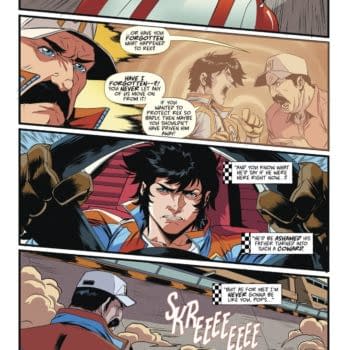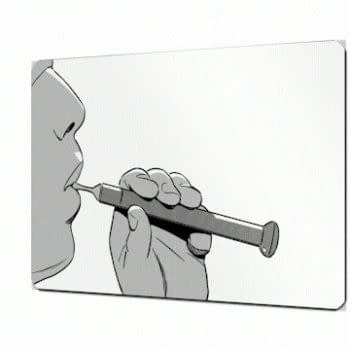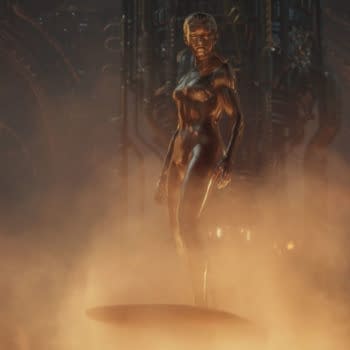Posted in: Comics, Recent Updates, san diego comic con | Tagged: cameron stewart, chuck palahniuk, dark horse, David Mack, entertainment, Fight Club 2, jeff lemire, matt kindt, Pastaways, san diego comic con, scott allie
Dark Horse Is All About Highpowered Collaboration At San Diego Comic Con – Kindt, Stewart, Mack, Palahniuk, Lemire
Scott Allie, Matt Kindt, Cameron Stewart, David Mack, Chuck Palahniuk, Jeff Lemire engaged fans on Sunday midday at San Diego Comic Con and the lineup was enough to make you step back and realize just where Dark Horse stand right now. It looked like a mini Image Expo up there, if that's not too trite a comparison. The creators were all hefty, highpowered names, and in this case, they were here to talk about collaboration.
Matt Kindt talked about new book Pastaways, a straight up science fiction which will have a tiny dinosaur and giant robots, and coping with immortality.
Jeff Lemire introduced Black Hammer, which he's been working on since 2007, when it was going to be a graphic novel he drew himself, but now he's resurrected it, a "love letter to superhero comic", one from each era of comic history, wiped out of continuity, all waking up on a farm and trying to get back to the place they came from while wandering in small town life. The homage info pages looked straight from the history of superhero comics past, "Who's Who", modelled on DC comics, including Abraham Slam and a Warlord from Mars. The artwork looked stunning, some in sepia sketches.
Fight Club 2, announced last week, can't be revealed too much but Chuck Palahniuk reminded us that the first book ended with the main character in a mental hospital, with only a few bits about his past known. He decided "Why couldn't it be a prequel and a sequel" and decided "Why couldn't this have destroyed previous generations in the past?" The protagonist is a child, the next generation, and Marla and the narrator have not had great sex in 10 years and she's desperate, willing to coax Tyler out of supression by medication. It's a 10 issue series jumping into the past, staying in the present, all placed 10 years after the first story.
Dark Horse will be bringing out more editions of David Mack's previous work, including Dream Logic, originally a 4 issue series that had "artbook" aspects, according to Mack. They are going to collect them into one hardcover with 48 pages extra materials and autobiographical stories in mixed media.
Allie said that everyone on the stage are artists who have worked with other people before, but they've also worked alone in the past. All the current projects discussed are, nevertheless, collaborations. Stewart joked that collaboration "is faster", but also likes the fact that it's "all there, all written", and he's been told regarding Fight Club 2 "It's written now. Surprise me", by Palahniuk. Working with Chuck, he tried to decide how to handle a hefty amount of dialogue, at which point, Chuck picked up a pen and crossed out the dialogue, showing his willingness not to be a "slave to what's on the page".
Allie asked Palahniuk what was appealing about making Fight Club a comic, and knowing he'd have to collaborate since he couldn't draw 250 pages. Palahniuk said he enjoyed being a "student" again, since he knows what he's doing in prose, but wanted to learn from others about new storytelling forms. To be "52 years old and back in school" was an idea that appealed, he said. People have criticized him for writing 2 dimensional, cartoonish characters, but his intention was never to make people fall in love with his characters. Like Bertold Brecht, he wants people to remember "it's not real" and look at the message inside the characters. His cartoony characters wouldn't be made so realistic that they overwhelmed a deeper message, he said, in comics, and that's what he wants. He gave 3 reasons in total for liking collaboration and said "and that's enough".
Kindt said that as he's gotten older, he has more ideas than he can get to, and at 40 realistically feels he might die before he gets to all his ideas, and doesn't feel with Pastaways that he could do as well with the art. Scott Kolins, the artist on Pastaways, frees Kindt to write about things that he can't draw himself particularly well and he doesn't have to write around those limitations. He has been able to "add a layer of weirdness" based on that.
David Mack just did a new Kabuki story for Dark Horse Presents, the first in many years, and it went from 8 pages to 9 just to hold enough, something that could easily have been a full issue.
Matt Kindt it's a weird industry that not many people know the ins and outs of working in comics, which means it's a learning process for newcomers and the support of peers is very important. They broke into comparing bad reviews on the panel, sharing war stories in comics. Some of the panelists actually had discussed the projects they were working on in different pairs than they ended up with, though all now on the same panel. Dave Cameron said he's not as "isolated' as comics can sometimes make artists–he shares a studio with people who work in the French comics industry and German game industry where he lives in Berlin. He likes being exposed to different influences but sometimes feels "removed" from this part of things, and it has to be a big event to bring him over from Europe.
During the Q&A, Palahniuk talked about learning the "rules" of comics like page turns and making panels the beginning or end of movement to guarantee how to achieve success, just like Fight Club, and it's about learning a new recipe in detail.
An audience asked the panelists what it is about Dark Horse that makes them bring their books to the publisher. When Stewart was working on Sin Titulo without a net, most publishers wanted to "know the ending" and only Dark Horse were happy with what he had done so far and thought "Even if you fuck it up, it was worth it". Kindt had a similar story, since when he pitched Mind MGMT to Dark Horse with subliminal text and back matter and DH just said, "Let's go. Let's do it" and Mind MGMT is a series that couldn't exist anywhere else in any other format, he said.
An audience member commented that Dark Horse simply trusts creators to know where they want to go with their stories, and Stewart commented that it's trusting the reader too, knowing that they don't need to be "spoon fed" which prompted a round of applause for the sentiment.
Talking about digital comics and the problems of a double-page spread on an iPad, Kindt commented that the artist needs to be aware and take responsibility for the format, knowing the limitations to make it work.
The Fight Club 2 team were moving on after the panel to sign at Dark Horse's booth at 1:15.



















